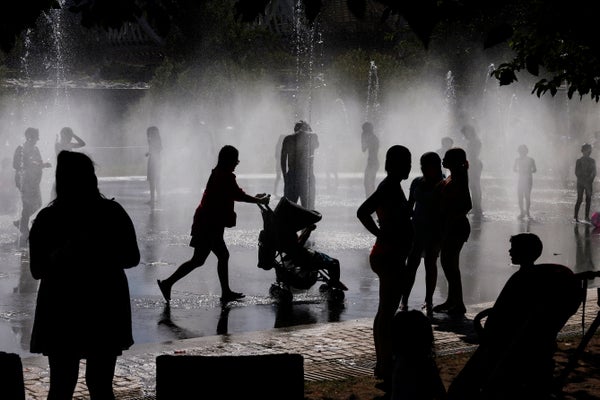Extreme Heat Is the Deadliest Weather Disaster
Hundreds of thousands of people die from extreme temperatures every year, more than any other type of weather disaster

People cool off at a fountain in the Madrid Rio park amid heatwave conditions in Madrid on July 23, 2024. July 21, 2024 was the hottest day ever registered globally, according to preliminary data published on July 23, 2024 by the EU’s climate monitor.
Oscar del Pozo/AFP via Getty Images
CLIMATEWIRE | The United Nations chief implored government leaders to protect the Earth’s 8.1 billion people from withering heat waves that in recent days have caused deaths, blackouts and drought conditions around the world.
The urgent plea came days after the planet set a new record for the hottest day ever recorded — and then immediately broke it.
On one level, the four-point call-to-action seems almost quaint. Scientists and health officials have known for decades that people have been heating up the planet at great risk to themselves.
On supporting science journalism
If you’re enjoying this article, consider supporting our award-winning journalism by subscribing. By purchasing a subscription you are helping to ensure the future of impactful stories about the discoveries and ideas shaping our world today.
But the stark warning delivered by U.N. Secretary-General António Guterres underscored how the consequences of global warming have become more apparent — and dangerous — in recent years.
“If there is one thing that unites our divided world, it’s that we’re all increasingly feeling the heat,” Guterres said on Thursday. “Earth is becoming hotter and more dangerous for everyone, everywhere.”
Guterres’ call to action offered four recommendations to world leaders.
First, they should protect their most vulnerable people, because heat disproportionately affects people who are older, or pregnant, or who have preexisting health problems. It is also more dangerous for low-income communities.
Second, stronger protections are needed for workers who are increasingly exposed to extreme heat on the job. A new report from the International Labour Organization, also released Thursday, found that more than 70 percent of the global workforce is exposed to excess heat, and that 4,200 workers globally died during heat waves in 2020.
Also, leaders should boost economic resilience using the best data and science, Guterres said. Extreme heat threatens economies by damaging infrastructure, agriculture, water supplies, health systems, electric grids and worker productivity.
Finally, governments should continue to address the root cause of rising temperatures by striving to keep global warming below 1.5 degrees Celsius, the Paris Agreement’s most ambitious target.
The call to action comes at a time of growing global awareness — and suffering — around extreme temperatures. Last year was the hottest ever recorded, and scientists say it’s likely 2024 will beat that record. This past June was the 13th month in a row to break a monthly global temperature record.
It’s the continuation of a long-term trend. Every year since 2014 has ranked among the Earth’s top 10 hottest years.
Extreme heat has also emerged as the deadliest weather-related killer worldwide. According to the U.N., it has killed about 489,000 people each year since 2000. Around 18,970 deaths annually are attributed to workers exposed to dangerous temperatures.
Despite its dangers, extreme heat has often received less attention and fewer adaptive resources than other climate-related disasters, such as hurricanes and wildfires. But that’s changing. In the past few years, leaders worldwide have begun to devote special attention to the risks of intensifying heat waves.
A handful of cities have hired chief heat officers, including Los Angeles, Miami and Phoenix, as well as Melbourne, Australia; Athens, Greece; Freetown, Sierra Leone; Dhaka, Bangladesh; and Santiago, Chile. These officers are tasked with developing new initiatives to lower urban temperatures and protect residents when heat waves strike.
Cities have also experimented with new systems for naming or ranking heat waves, similar to the way meteorologists categorize hurricanes. A heat wave ranking program launched in Athens, Greece, in 2021 has expanded to six cities across the country. And California is currently developing its own heat wave ranking system to be launched by the end of this year.
Cities and states have also devised heat action plans to protect populations during heat waves by issuing early warnings, opening cooling centers and sending task forces to check on vulnerable populations.
The impacts of intensifying heat are especially strong in low-income and developing nations, many of which are located in the hottest regions of the planet and are home to some of its most vulnerable populations.
Yet extreme temperatures are now affecting wealthy people too, Guterres said. And he hopes that the call to action will spur rich nations to invest in greater global financing for heat adaptation and climate mitigation.
“Why should it happen now?” he said. “In the beginning, climate change was not being felt by the majority of the population — or at least by the majority of the population that have a huge contribution to decision-making systems. … Now, the heat is being felt by those that have decision-making capacity. And that is my hope.”
Reprinted from E&E News with permission from POLITICO, LLC. Copyright 2024. E&E News provides essential news for energy and environment professionals.








